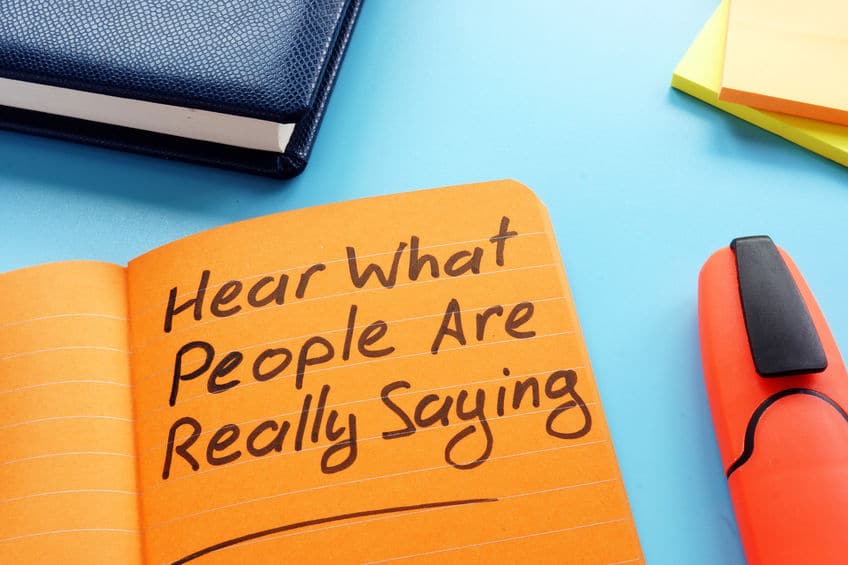Calm Down Anyone By Ignoring What They Say
Eliminate messy fights and arguments, build loyalty and trust, and create deep intimacy in your business, professional, and personal relationships by listening to emotions instead of words.

Our World Is Messy. I Know It. You Know It.
Maybe you disagree with a business partner, and it’s getting out of hand. Maybe you are having trouble getting along with a critical employee. Maybe someone important is angry at you. Maybe you are avoiding a difficult conversation with your board of directors. There may be family fights that seem incessant and never-ending. Maybe you’ve lost an intimate connection with your partner or children.
The reality is that we're all human, and sometimes we fight. But when it happens over and over again with the same person, or even with different people, it can be draining.
When you're in the middle of a disagreement, it's hard to see past your point of view. It's easy to lose sight of what's really important: building trust and respect with the people around you. It’s too easy to fight to be right.
But It Doesn't Have To Be This Way

It doesn't have to be that way. By ignoring what people say and listening to their feelings and emotions, you eliminate messy fights and arguments, build loyalty and trust, and create deep intimacy in your business, professional, and personal relationships.
No matter how messy or difficult the situation is, you can clean up any messiness in your life now (and prevent messiness from occurring again). And while you do this, you will make sure that intimacy and trust is rebuilt between everyone involved—creating loyalty and gratitude that will last for years to come!
What Happens When You Ignore The Words And Listen To The Emotions
They say
Doug's work has been transformative for me, my students, and my family.
Jim - Middle School Science Teacher
I am now fearless with people who confront me.
Peggoty - Divorce Coach and Mediator
When I approach a difficult, emotional conversation, I am no longer scared because I have tools I can rely upon.
Marnie - Coach

Typical Messes
Sarah
Sarah had been leading her company for many successful years. However, tensions had been rising between Sarah and the board of directors, who felt that Sarah was making decisions without their input and not listening to their concerns.
One day, the board called a meeting to discuss their grievances with Sarah. The room was tense, and both sides were defensive and unwilling to listen to each other. Sarah felt attacked and criticized, while the board felt ignored and disrespected.
In the midst of this conflict, Sarah remembered her training. She took a deep breath and decided to try using these techniques to resolve the conflict.
First, she listened carefully to each board member's concerns without interrupting or defending herself. She repeated back what she had sensed they were feeling using "you" statements to show that she understood their perspective. "You are frustrated that I haven't been involving the board in decision-making. You feel left out of the process."
As she continued to listen and reflect back emotions, Sarah noticed that the tension in the room began to ease. The board members started to feel heard and validated, and they began to open up more about their concerns.
Using affect labeling, Sarah was able to identify and acknowledge the emotions that the board members were experiencing. "You are feeling undervalued and disrespected, and you are frustrated," she said.
As the conversation continued, both sides began to see the issue from each other's perspectives. The board realized that Sarah had been trying to make the best decisions for the company, and Sarah recognized that the board's input was valuable and necessary for the company's success.
In the end, Sarah and the board were able to come to a solution that satisfied everyone. They agreed to hold more frequent meetings to discuss decisions and involve the board in the process, while allowing Sarah the freedom to make decisions when necessary.
Thanks to the power of empathic listening and affect labeling, Sarah resolved the conflict with the board and strengthened their working relationship. She learned that truly listening and understanding others' perspectives is the key to resolving conflicts and building solid relationships in both business and personal settings.

James and Emily
James and Emily had been together for many years. However, over time, their communication deteriorated, and they found themselves arguing more and more frequently.
James was a logical thinker and tended to express himself in a straightforward manner. On the other hand, Emily was more emotional and tended to express herself through her feelings.
Whenever they had a disagreement, James would try to solve the problem logically, while Emily would get upset and emotional, feeling like James wasn't listening to her. This led to many arguments and hurt feelings.
One day, they decided to seek me to help them work through their communication issues. I introduced them to the concept of affect labeling, which involves identifying and labeling the emotions that someone is feeling.
At first, James was skeptical, but he agreed to give it a try. During their next argument, instead of trying to solve the problem right away, James took a moment to identify and label Emily's emotions. "You're feeling frustrated and overwhelmed right now," he said.
To his surprise, Emily's mood instantly softened, and she began to open up about her feelings. James continued to use affect labeling during their arguments, and Emily found that she was better able to express herself and feel heard.
As a result, they built a deeper intimacy between them and stopped fighting altogether.

I Clean Up Messes Too
Sometimes, the mess may be too much for you to handle. Not a problem. As a professional mediator and peacemaker for over 40 years, I can help. Sometimes, my help is needed in unexpected ways.
I was invited to hold a training session at a corporate headquarters a few months ago. The co-founder told me she would like me to teach the session. But before accepting, a few things happened that made me question her sincerity. First, I discovered that there was no budget approval from the CFO and no joining instructions from her team members (a minor mistake). However, I received another call from two board members who wanted me to come in and help the co-founders. They said that they were tired of seeing the co-founders bickering with each other and making mistakes in their work together.
I asked if we could work on the co-founders’ problem before conducting any training. I said that it would be a great test of my techniques. Everyone agreed, and we proceeded.
We spent a day in the process, and at the end, the co-founders recognized that their goals and values had diverged. They settled on a solution that honored their history and their future goals. The fight was over. When I returned to train their team, they were my biggest cheerleaders. These stories make me smile.

What's My Secret?
People resort to passive-aggressive behavior in arguments. The funny thing is, it's usually not even conscious. It's like an emotional sixth sense makes us feel it's time to act out when we argue with someone. We don't know what happened that made us feel this way, but somehow we need to release the tension inside us.
As disagreements escalate in arguments, the emotional centers of our brains activate to overwhelm the prefrontal cortex, which is the thinking part of our brain. When the prefrontal cortex is kicked offline, we are left with scripts and programming embedded during childhood. We cannot make decisions and can only react to what is happening based on what we learned as children. That usually turns out poorly.
Brain scanning studies show that a specific type of deep listening de-escalates conflicts that otherwise grow into arguments and serious problems such as lost business opportunities and strained relationships. The skill is called affect labeling and is the most profound form of listening because you are listening to emotions, not words.
Emotional listening allows you to get your point across better after you've listened your partner/friend/colleague/family member into existence. Once they feel validated, they are open to listening to you.

Tired Of The Overwhelm?
Are you tired of feeling overwhelmed and misunderstood in your personal and professional relationships? Do you long for a deeper connection with those around you?
The key to building solid relationships is empathy and understanding. By genuinely acknowledging emotions, you can create a safe and supportive environment where everyone feels heard and valued.
My program focuses on two fundamental techniques: empathic listening and affect labeling. Empathic listening involves listening to the speaker without interrupting or judging, and then reflecting back what they have said using "you" statements. This allows the speaker to feel heard and validated while clarifying any misunderstandings.
Affect labeling is the process of identifying and acknowledging the emotions that the speaker is experiencing. This helps to create a deeper level of understanding and empathy, and leads to more meaningful and productive conversations.
These skills are counter-intuitive and counter-normative, meaning many people struggle to learn them without help.
This is where I come in. As a graduate professor, trainer, and coach, I have worked with thousands of people, teaching them how to listen. I have worked in maximum security prisons, training inmates to de-escalate violent conflicts . In the Congressional Budget Office, I have trained analysts how to de-escalate Members of Congress. If I can train a murderer to be a peacemaker, imagine what I can do for you?
You will use these techniques in your everyday life to create stronger relationships with those around you. You will also gain a deeper understanding of your own emotions and how to express them in a healthy and productive way.
Working With Me
I offer individual and group training from one month to three months. Create intimacy, trust, loyalty, and gratitude in the people around you by learning what to say, how to say it, and when to say it no matter how messy the situation gets!
Say goodbye to the messiness of life and hello to deeper connections and understanding.